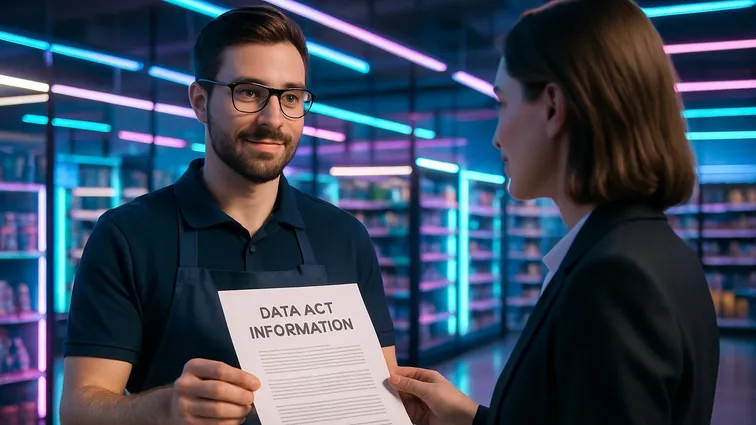In our previous articles we introduced the key principles of the European Data Act and described in detail the obligations it imposes on manufacturers and data holders. In this third part of the series, we turn our attention to other important players in the data economy – sellers, lessors, and providers of leasing for connected products. From 12 September 2025 at the latest, these entities will be required to meet a new obligation: to provide customers with information about the data generated by a device before concluding a purchase, rental, or leasing agreement for that device.
One of the key innovations introduced by the Data Act is the obligation to inform customers transparently before entering into a contract for the purchase, rental, or leasing of a connected device. The goal is to ensure that future users have clear and sufficient information about what data the device will generate and how that data can be used.
The pre-contractual information obligation applies to all entities that sell, rent, or lease connected devices to end users – typically electronics retailers, car dealers, mobile operators offering smart devices as part of tariff packages, or leasing companies. By contrast, the new obligation does not apply where the product is not considered a connected device under the Data Act. This includes, for example, standard mechanical products without network connectivity (such as a mechanical thermostat), prototypes not yet placed on the market, or devices not intended for the EU market – such as products manufactured exclusively for export outside the European Union.
Under the Data Act, the information obligation also applies to the sale of used (“second-hand”) devices and connected products that were placed on the market before the regulation took effect, provided that these devices continue to generate data from their sensors after 12 September 2025. This means the rules also extend to electronics resellers, car dealerships, and leasing companies that return devices to circulation. At each subsequent transfer – whether of a new or used product – the next user must be informed in advance about what data the device generates, who holds that data, and how they can exercise their newly acquired rights to it.
Before concluding a purchase, rental, or leasing contract for a connected device, the customer must be informed in advance about:
- 📊 the type, format, and estimated volume of data the device will generate during use;
- 🕒 whether the device generates data continuously and in real time or, for example, only at certain intervals;
- ☁️how and where the data is stored – whether directly in the device or on a remote server – as well as the planned retention period;
- 🔐 the options for accessing, searching, deleting, and transferring the data, including the technical tools and service quality provided for these functions.
This information must be provided in a clear, transparent, and permanently accessible way – for example, via a QR code on the product packaging or through a stable link to a web interface where the user can download the information to their own device. With this requirement, the Data Act aims to ensure that users can make informed decisions not only about which device to purchase, but also about what data will be available to them and how they will be able to use it further.
Manufacturers are essential
For sellers, lessors, or leasing companies to meet their obligations, they must obtain the necessary information from manufacturers – the entities that design the devices and have access to the data they generate. In practice, this means establishing a new flow of information within the supply chain, where the manufacturer provides a data profile of the device and the retailer makes it available to the user.
From experience, we know that especially in the automotive and consumer sectors, new tools will be needed – for example, customer portals with data overviews, pre-contractual information forms, or updated general terms and conditions.
What to watch out for
The information obligation under the Data Act is not just a technical checklist to be ticked off. The regulation explicitly requires that information be provided to customers in a clear, structured, and user-friendly manner – in a form they can truly understand and easily find and use. It is therefore not sufficient to simply refer to general terms and conditions or to bury details in a technical manual hidden in an annex.
Also pay close attention to the scope of the obligation – and its exceptions. The regulation applies only to connected products, i.e. devices capable of generating and sharing data about their operation or environment. If you sell purely mechanical or analogue devices (such as a traditional thermostat or a lock without electronics), the obligation does not apply to you.
The Data Act will become directly applicable on 12 September 2025. By then, all sellers, lessors, and leasing companies should have appropriate processes and documentation in place. If you supply smart devices to end users, now is the time to start preparing.
What needs to be done?
- ✅ Map your product range and verify which devices fall under the definition of connected products under the Data Act;
- ✅ Obtain from manufacturers or service providers all mandatory information about the data generated, its format, access, and storage;
- ✅ Set up internal processes – how to provide this information to customers in the pre-contractual stage, how to update it, and how to manage it across distribution channels.
Don’t wait until the last minute. The Data Act will affect the sale of smart devices across sectors – from e-commerce and automotive to pharmaceuticals and retail. If you need a review of your pre-contractual documentation, adjustments to internal processes, or help interpreting the rules, we will be happy to assist you in preparing all that is required.








